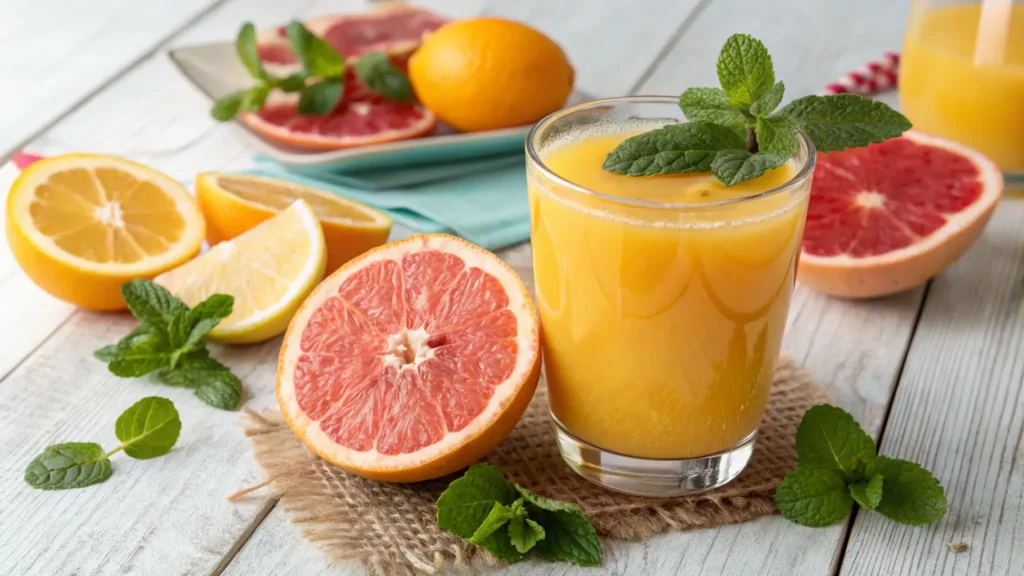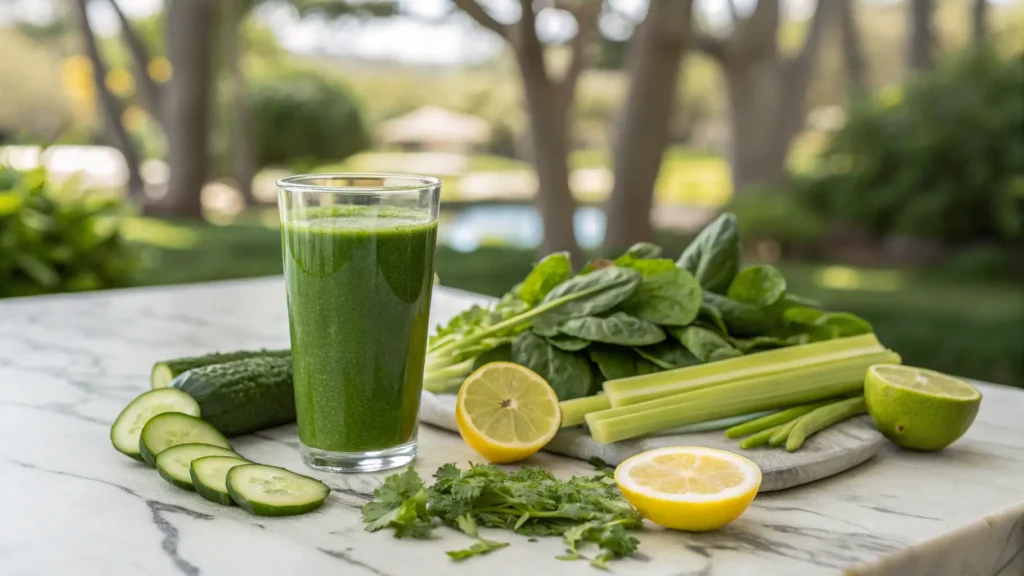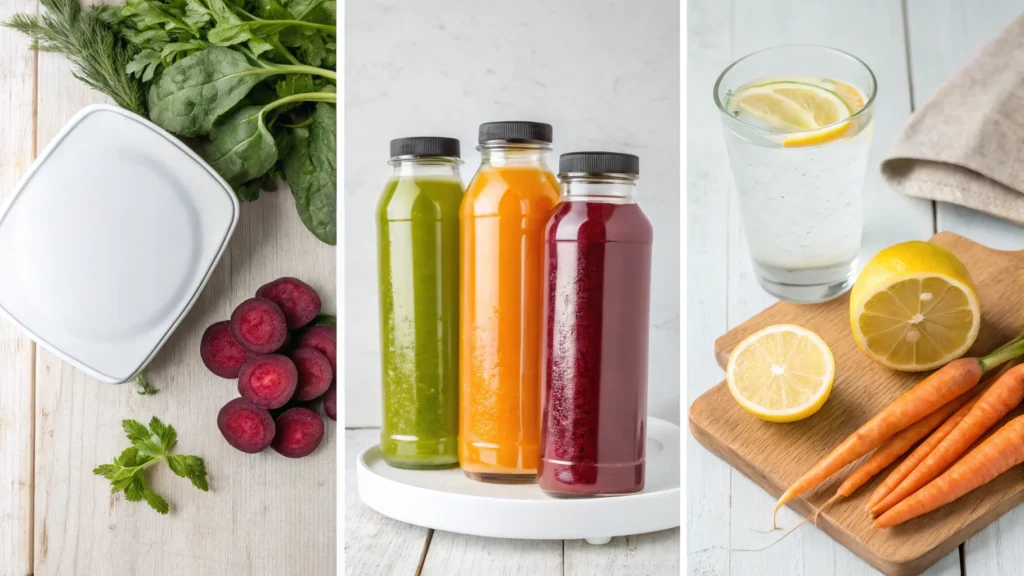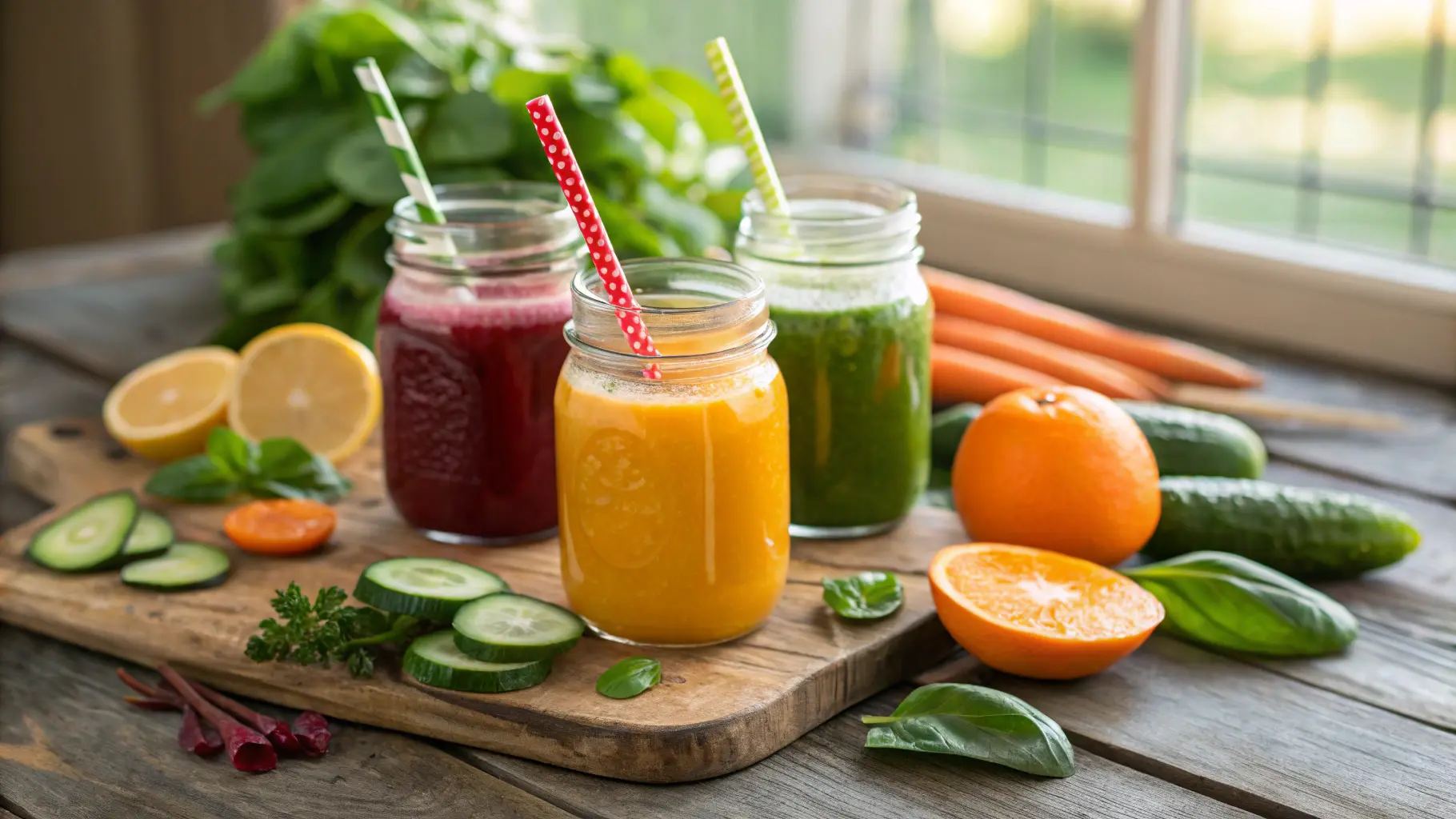Juicing has become a popular trend for those looking to lose weight quickly, cleanse their bodies, or give their digestive system a break. But does drinking only juice for three days really help with weight loss? If so, how much weight can you realistically expect to lose?
In this in-depth guide, we’ll explore how much weight you can lose in 3 days of juicing, what factors influence weight loss, and whether juicing is a sustainable method for long-term fat reduction. You’ll also get a sample 3-day juice cleanse plan, learn about potential side effects, and discover the best ways to transition back to solid foods.
Now, let’s dive into the details!
Table of contents
- Introduction to 3-Day Juicing for Weight Loss
- How Much Weight Can You Lose in 3 Days of Juicing?
- Science Behind Juicing and Weight Loss
- Pros and Cons of a 3-Day Juice Cleanse
- Sample 3-Day Juice Cleanse Plan
- FAQs – What People Ask About a 3-Day Juice Cleanse
- Final Thoughts – Is a 3-Day Juice Cleanse Right for You?

Introduction to 3-Day Juicing for Weight Loss
Juicing has been around for years, but recently, 3-day juice cleanses have gained traction among those looking for a quick fix for weight loss. Before you start, it’s essential to understand what a juice cleanse is, why people try it, and how it works for short-term weight loss.
What Is a Juice Cleanse?
A juice cleanse is a short-term liquid diet where you consume only fresh fruit and vegetable juices while eliminating solid foods. The goal is to flood the body with vitamins, minerals, and antioxidants while giving the digestive system a break.
There are different types of juice cleanses:
- Cold-pressed juice cleanse – Uses hydraulic press technology to extract more nutrients.
- Homemade juice cleanse – Uses a standard juicer to make fresh juices at home.
- Store-bought cleanse programs – Pre-packaged juice plans from wellness companies.
Regardless of the type, the idea is to replace all meals with nutrient-dense juices for a short period.
Why People Try a 3-Day Juice Cleanse for Weight Loss
Many turn to juice cleanses as a way to lose weight fast, reset their eating habits, or detoxify their bodies. Some key reasons why people try a 3-day juice cleanse include:
– Quick weight loss – People claim to lose between 2 to 5 pounds in just three days.
– Reduced bloating – Cutting out processed foods and dairy can reduce bloating.
– Improved digestion – Juices are easy to digest, giving the gut a break.
– Increased hydration – Juice contains a high water content, keeping the body hydrated.
– Mental clarity – Some say juicing improves focus and reduces brain fog.
However, it’s important to note that most of the weight lost is water weight and not actual fat loss.
How Juicing Works for Short-Term Weight Loss
Juicing leads to caloric restriction, which is the primary reason for short-term weight loss. Here’s how it works:
- Lower calorie intake – Most juice cleanses provide 800 to 1,200 calories per day, putting your body in a deficit.
- Elimination of processed foods – Cutting out refined carbs, sugars, and unhealthy fats reduces bloating.
- Increased fiber intake – Some juices contain fiber, helping to regulate digestion and improve gut health.
- Flushes out excess water – Juicing can act as a natural diuretic, helping you shed excess water weight.
While a 3-day juice cleanse can lead to rapid weight loss, the results aren’t always long-lasting. In the next section, we’ll explore exactly how much weight you can lose in 3 days of juicing and what factors influence the results.
👉 Up next: How much weight can you actually lose in just three days of juicing? Let’s break it down! 🚀
How Much Weight Can You Lose in 3 Days of Juicing?
Juicing for weight loss is popular because it promises quick results in a short time. But exactly how much weight can you lose in 3 days of juicing? The answer varies depending on several factors, including your starting weight, metabolism, and juice ingredients.
Some people report losing 2 to 5 pounds in just three days. However, most of this weight is likely water weight rather than fat loss. While juicing can jumpstart weight loss, maintaining these results requires a balanced approach after the cleanse.
Expected Weight Loss: What Research and Experience Say
Several studies and personal experiences suggest that a 3-day juice cleanse can result in an average weight loss of 2 to 4 pounds. Here’s why:
– Caloric restriction – A typical juice cleanse provides 800 to 1,200 calories per day, which is much lower than the average daily intake. This leads to a temporary calorie deficit.
– Water weight reduction – Juicing eliminates processed foods and excess sodium, which helps the body shed stored water.
– Reduced bloating – Cutting out dairy, gluten, and refined carbs can result in a flatter stomach.
In some cases, people claim to lose up to 7 pounds, but this is less common and depends on body composition and activity levels.
Factors That Affect Weight Loss on a Juice Cleanse
Not everyone experiences the same weight loss results. Several factors determine how much weight you lose in 3 days of juicing:
- Starting weight – The more weight you have to lose, the faster you may drop pounds initially.
- Metabolism – A faster metabolism burns more calories, even on a juice cleanse.
- Activity level – Staying active during a juice cleanse can enhance fat burning.
- Juice ingredients – Low-sugar, high-fiber juices are better for weight loss than fruit-heavy ones.
Water Weight vs. Fat Loss: Understanding the Difference
It’s crucial to understand that most weight loss from a 3-day juice cleanse is water weight, not fat loss.
- Water weight – When you reduce carbs and processed foods, your body releases stored water, leading to rapid weight loss.
- Fat loss – Losing actual fat takes longer and requires a sustained calorie deficit over weeks or months.
While a juice cleanse can help kickstart weight loss, it’s not a long-term solution for fat loss. The key to keeping the weight off is transitioning to a balanced diet after the cleanse.
👉 Next up: How does juicing affect your metabolism and overall fat-burning process? Let’s find out!
Science Behind Juicing and Weight Loss
Many people believe that a 3-day juice cleanse helps the body burn fat more efficiently. But is that really the case? While juicing does reduce calorie intake, its impact on metabolism, muscle mass, and digestion is often misunderstood.
How Juicing Impacts Metabolism
One common myth is that juice cleanses slow down metabolism. However, a short 3-day juice cleanse is unlikely to cause a major drop in metabolic rate.
– You’re still consuming calories – Since juice contains natural sugars and carbohydrates, your body continues burning energy.
– Short-term fasting benefits – Some studies suggest that short fasting periods may improve insulin sensitivity and fat metabolism.
– Hydration aids digestion – Juices are water-rich, which helps maintain proper digestion and prevents sluggish metabolism.
That said, extreme calorie restriction over time can slow metabolism. If a juice cleanse lasts longer than a few days, your body may enter starvation mode, reducing calorie burn.
The Role of Caloric Deficit in Juice Fasting
Weight loss happens when you consume fewer calories than you burn. Since most juice cleanses provide 800 to 1,200 calories per day, they create a caloric deficit, leading to weight loss.
- Juices are low in protein – Protein helps preserve muscle mass, and its absence in a juice cleanse may cause muscle breakdown.
- Fiber content varies – Some homemade juices retain fiber, which helps digestion and keeps you fuller for longer.
- Blood sugar spikes – Fruit-heavy juices can cause sugar crashes, making you feel hungrier.
Does Juicing Affect Muscle Mass?
One downside of a 3-day juice cleanse is the potential loss of muscle mass due to low protein intake. Since muscles burn more calories at rest, losing muscle can lower your overall metabolic rate.
To prevent muscle loss:
– Choose vegetable-based juices with less sugar.
– Add plant-based protein (like chia seeds or almond milk) to some juices.
– Avoid prolonged juice fasting beyond three days.
While juicing helps with short-term weight loss, maintaining muscle mass and metabolic health requires a balanced approach after the cleanse.
👉 Coming up next: What are the benefits and risks of a 3-day juice cleanse? Let’s take a closer look!
Pros and Cons of a 3-Day Juice Cleanse
A 3-day juice cleanse can be an exciting way to reset your diet and lose weight quickly, but it comes with both benefits and risks. Before diving in, it’s important to weigh the pros and cons to determine if it’s the right choice for you.
Benefits of Juicing for Short-Term Weight Loss
– Rapid weight loss – Many people lose 2 to 5 pounds in just three days due to caloric restriction and reduced bloating.
– Improved digestion – Fresh juices contain enzymes and fiber that help cleanse the digestive system.
– High nutrient intake – Juicing provides a concentrated dose of vitamins, minerals, and antioxidants.
– Hydration boost – Most juices contain a high water content, keeping the body well-hydrated.
– Eliminates processed foods – Removing processed sugars, unhealthy fats, and refined carbs may help reset eating habits.
While these benefits are promising, there are some downsides to consider.
Downsides and Risks of Juice-Only Diets
– Temporary weight loss – Since most of the weight lost is water weight, it may return once solid foods are reintroduced.
– Blood sugar spikes – Fruit-heavy juices can cause sudden sugar highs and crashes, leading to hunger and fatigue.
– Lack of protein and fiber – Juice cleanses lack essential macronutrients like protein and healthy fats, which can cause muscle loss and increased cravings.
– Fatigue and headaches – A sudden drop in calorie intake may lead to low energy, dizziness, and headaches.
– Not sustainable long-term – A 3-day juice cleanse is not a long-term weight loss solution. Without a proper post-cleanse meal plan, the weight can return quickly.
Who Should Avoid Juice Cleanses?
A 3-day juice cleanse may not be suitable for everyone. People with the following conditions should avoid or consult a doctor before starting a juice cleanse:
- Diabetes or blood sugar issues – High fruit content can cause unstable glucose levels.
- Pregnant or breastfeeding women – Juice cleanses lack essential nutrients needed for both mother and baby.
- People with digestive disorders – Those with IBS or acid reflux may experience discomfort due to high acidity.
- Anyone with a history of eating disorders – Juice cleanses can encourage unhealthy food restriction habits.
While juicing can be beneficial in the short term, it’s important to listen to your body and choose a method that supports long-term health and well-being.
👉 Up next: A sample 3-day juice cleanse plan to help you get started!

Sample 3-Day Juice Cleanse Plan
If you’re ready to try a 3-day juice cleanse, having a structured plan can make the experience smoother. The key is to consume nutrient-dense, low-sugar juices while staying properly hydrated.
Best Fruits and Vegetables for Weight Loss Juices
Not all juices are created equal! If your goal is weight loss, focus on low-calorie, high-fiber ingredients.
– Best vegetables: Spinach, kale, cucumber, celery, beets, carrots, and bell peppers.
– Best fruits: Green apples, berries, lemons, limes, and grapefruit.
– Other boosters: Ginger, turmeric, chia seeds, flaxseeds, and lemon juice.
Try to avoid too many high-sugar fruits, like bananas, mangoes, and grapes, as they can lead to sugar spikes.
3-Day Juice Cleanse Schedule
Here’s a simple 3-day juicing schedule to help you stay on track:
Day 1
- Morning: Green detox juice (spinach, cucumber, lemon, apple, ginger).
- Mid-morning: Carrot-orange juice with turmeric.
- Lunch: Beetroot and celery juice for digestion.
- Afternoon: Cucumber and lemon juice for hydration.
- Dinner: Spinach and green apple juice.
- Before bed: Chamomile tea (non-juice option for relaxation).
Day 2
- Morning: Lemon-ginger detox shot.
- Mid-morning: Berry antioxidant juice (blueberries, strawberries, lemon).
- Lunch: Celery, kale, and apple juice.
- Afternoon: Pineapple and cucumber juice.
- Dinner: Carrot and beetroot juice.
- Before bed: Warm herbal tea.
Day 3
- Morning: Celery and green apple juice.
- Mid-morning: Orange, carrot, and ginger juice.
- Lunch: Spinach, lemon, and parsley juice.
- Afternoon: Cucumber and lime juice.
- Dinner: Beet, carrot, and apple juice.
- Before bed: Peppermint tea.
Drinking plenty of water and herbal teas alongside juices can enhance detoxification and prevent dehydration.
Hydration and Other Essentials During a Juice Cleanse
Juicing alone isn’t enough—staying hydrated and supporting your body with the right habits is essential.
– Drink at least 2-3 liters of water per day to help flush out toxins.
– Listen to your body—if you feel extremely fatigued, consider adding a small protein source (like a handful of nuts).
– Prepare for hunger—hunger is normal on a 3-day juice cleanse, but drinking herbal tea can help curb cravings.
– Ease into it—reduce caffeine, sugar, and processed foods before starting the cleanse for better results.
A juice cleanse can be a refreshing way to reset your diet, but it’s important to transition back to solid foods carefully. In the next section, we’ll explore how to safely return to a healthy eating routine after juicing.
👉 Next up: How to transition back to solid foods and maintain your weight loss!

FAQs – What People Ask About a 3-Day Juice Cleanse
When considering a juice cleanse, many people have questions about weight loss, safety, and effectiveness. Here are some of the most common questions people ask when searching for How much weight can you lose in 3 days of juicing?
Can You Lose 10 Pounds in 3 Days of Juicing?
It’s unlikely to lose 10 pounds in just three days, but some people may experience a drop of 3 to 5 pounds, mainly due to water weight loss. A 3-day juice cleanse creates a caloric deficit, leading to temporary weight loss, but losing 10 pounds in such a short time is not typical.
For sustainable weight loss, focus on long-term dietary changes instead of relying solely on a juice cleanse.
Will a Juice Cleanse Detox Your Body?
Many people believe that juicing helps flush toxins from the body, but the truth is, your liver and kidneys already detoxify your system naturally.
However, a 3-day juice cleanse can support your body by:
– Reducing processed food intake
– Providing hydration and antioxidants
– Giving your digestive system a short break
Juicing is not a miracle detox method, but it can help you reset unhealthy eating habits and increase your intake of nutrient-rich foods.
Is It Safe to Exercise During a Juice Cleanse?
Light exercise like walking, and stretching is generally safe during a juice cleanse. However, high-intensity workouts should be avoided because your body lacks protein and complex carbs for energy and muscle recovery.
If you feel fatigued, listen to your body and prioritize rest over intense workouts.
How Often Should You Do a Juice Cleanse?
A 3-day juice cleanse can be done once every few months as a reset. However, frequent juice cleanses may lead to nutrient deficiencies and muscle loss. Instead of relying on repeated juice cleanses, focus on healthy eating habits for long-term results.
👉 Next up: Final thoughts—should you try a 3-day juice cleanse?
Final Thoughts – Is a 3-Day Juice Cleanse Right for You?
After exploring the details of how much weight you can lose in 3 days of juicing, the question remains: Is this the right method for you? The answer depends on your goals, health, and lifestyle.
Who Benefits the Most from Juicing?
A 3-day juice cleanse may be a good fit if you:
– Want to jumpstart weight loss and reduce bloating
– Need a short break from processed foods and sugar
– Want to increase your fruit and vegetable intake
– Have no underlying health conditions that could be worsened by fasting
If you’re looking for long-term weight loss, a juice cleanse alone won’t be enough—it needs to be followed by healthy eating and regular exercise.
Final Recommendations for Safe and Effective Weight Loss
If you decide to try a 3-day juice cleanse, follow these best practices for the best results:
– Choose nutrient-rich, low-sugar juices to prevent sugar spikes.
– Drink plenty of water to stay hydrated.
– Listen to your body—if you feel weak or dizzy, adjust accordingly.
– Transition back to solid foods slowly to avoid digestive issues.
– Don’t rely on juicing alone—combine it with a balanced diet for sustainable weight loss.
A 3-day juice cleanse can be a refreshing way to reset your eating habits, but it’s not a long-term solution for fat loss. If your goal is to lose weight and keep it off, focus on healthy eating, portion control, and an active lifestyle.

